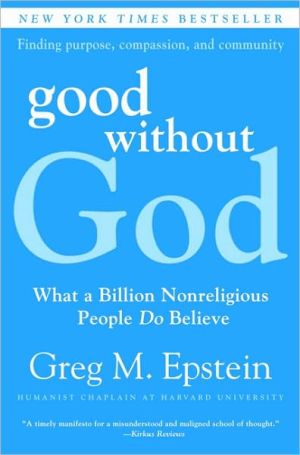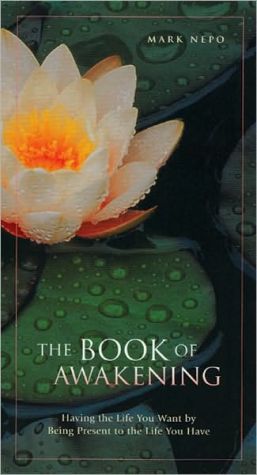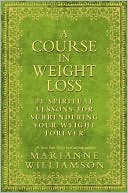Good without God: What a Billion Nonreligious People Do Believe
An inspiring and provocative exploration of an alternative to traditional religion\ \ Questions about the role of God and religion in today's world have never been more relevant or felt more powerfully. Many of us are searching for a place where we can find not only facts and scientific reason but also hope and moral courage. For some, answers are found in the divine. For others, including the New Atheists, religion is an "enemy."\ But in Good Without God, Greg Epstein presents another, more...
Search in google:
An inspiring and provocative exploration of an alternative to traditional religion Questions about the role of God and religion in today's world have never been more relevant or felt more powerfully. Many of us are searching for a place where we can find not only facts and scientific reason but also hope and moral courage. For some, answers are found in the divine. For others, including the New Atheists, religion is an "enemy." But in Good Without God, Greg Epstein presents another, more balanced and inclusive response: Humanism. He highlights humanity's potential for goodness and the ways in which Humanists lead lives of purpose and compassion. Humanism can offer the sense of community we want and often need in good times and bad—and it teaches us that we can lead good and moral lives without the supernatural, without higher powers . . . without God. Publishers Weekly The humanist chaplain at Harvard University offers an updated defense of humanism in response to the belligerent attacks on religion put forward by such new atheists as Richard Dawkins, Sam Harris and Christopher Hitchens. Epstein’s approach to religion is respectful, and for the most part, friendly. He sees liberal Christians, Unitarian Universalists, Jews and spiritual self-help gurus, such as Oprah Winfrey, as natural allies of humanists—though at times he seems impatient for them to admit they no longer believe in a transcendent God. A student of Sherwin Wine, the late rabbi and founder of Humanistic Judaism, Epstein’s humanism is rooted in his mentor’s essentially Jewish formulations. His most impassioned argument is with megachurch pastor Rick Warren and other evangelicals who believe secularism is the enemy and a moral society impossible without a belief in God. While such an argument may be needed, Epstein’s book is marred by redundancies and a lack of organization that suggests it was hastily put together. (Nov.)
Introduction ix\ 1 Can We Be Good Without God" 1\ 2 A Brief History of Goodness Without God, or a Short Campus Tour of the University of Humanism 38\ 3 Why Be Good Without a God" Purpose and The Plague 61\ 4 Good Without God: A How-To Guide to the Ethics of Humanism 104\ 5 Pluralism: Can You Be Good with God" 151\ 6 Good Without God in Community: The Heart of Humanism 169\ Postscript: Humanism and Its Aspirations 221\ Appendix: Humanist and Secular Resources 227\ Acknowledgments 241\ Notes 243
\ From Barnes & NobleTen percent of Americans and over one billion people worldwide are nonreligious, but media figures still registered surprised when President Barack Obama mentioned the "nonbelievers" in his inaugural address earlier this year. Greg Epstein, the humanist chaplain of Harvard University, maintains that nonbelievers are, in a sense, believers and deserve a seat at the interfaith table. In Good Without God, he speaks affirmatively and non-combatively about humanism and its relationship to other alternatives. A refreshing break from the Religion vs. Atheism range wars. Now in paperback.\ \ \ \ \ \ Publishers WeeklyThe humanist chaplain at Harvard University offers an updated defense of humanism in response to the belligerent attacks on religion put forward by such new atheists as Richard Dawkins, Sam Harris and Christopher Hitchens. Epstein’s approach to religion is respectful, and for the most part, friendly. He sees liberal Christians, Unitarian Universalists, Jews and spiritual self-help gurus, such as Oprah Winfrey, as natural allies of humanists—though at times he seems impatient for them to admit they no longer believe in a transcendent God. A student of Sherwin Wine, the late rabbi and founder of Humanistic Judaism, Epstein’s humanism is rooted in his mentor’s essentially Jewish formulations. His most impassioned argument is with megachurch pastor Rick Warren and other evangelicals who believe secularism is the enemy and a moral society impossible without a belief in God. While such an argument may be needed, Epstein’s book is marred by redundancies and a lack of organization that suggests it was hastily put together. (Nov.)\ \ \ Library JournalIn his first book, Epstein (humanist chaplain, Harvard Univ.) ambitiously attempts to present humanism as a positive life stance that consists of much more than just the absence of belief in a deity by combining history, philosophy, inspiration, and personal confession and generously sprinkling literary, philosophical, and pop cultural illustrations throughout. Opposing the two extremes of the new atheism and religious fundamentalism, he carves a middle path alongside religious moderates. By focusing on ethics and action rather than theology and belief, Epstein's vision is highly inclusive and emphasizes the vast common ground between the religious and nonreligious without diminishing or compromising the obvious differences. In this passionate collection of thoughts and ideas, he endeavors to educate the religious about the true nature of humanism and to inspire the nonreligious to consider constructively what they do believe rather than what they do not. VERDICT Positioned by the publisher as a response to Christopher Hitchens, Sam Harris, and Richard Dawkins, this is recommended for anyone interested in a positive and more tolerant contribution to the current God debate.—Brian T. Sullivan, Alfred Univ. Lib., NY\ \ \ \ \ Kirkus ReviewsA passionate introduction to the philosophy of humanism. We are living in a time when nearly one billion people worldwide claim to be nonreligious, writes Harvard University humanist chaplain Epstein. Even in the United States, one of the most religious of industrialized nations, some 40 million say no to belief in supernatural causality. So now is the time, writes the author, for a rallying cry in the name of humanism, a philosophy built on the idea of being good without a god. In his first book, Epstein recalls the long history of doubt, going back to Epicurus and Socrates, re-emerging in the Enlightenment and then again during the age of Freud, Marx and Nietzsche. Epstein successfully dispels the case that God is required if one is to be good. "This is not a book about whether one can be good without God because that question does not need to be answered-it needs to be rejected outright," writes the author. "To suggest that that one can't be good without belief in a god is not just an opinion, a mere curious musing. It is prejudice. It may even be discrimination." Socrates was the first to ask whether something is good because God loves it or if God loves it because it's good? If it's the latter, then logically speaking there's no need for God. More important, Epstein's convivial argument gets beyond the hairsplitting, condescension and animosity of so-called New Atheists like Richard Dawkins, Christopher Hitchens and Sam Harris to arrive at a constructive ideology that explains why it's important to be good even without the presence of the Almighty, and how to do it. Though the author's prose isn't as clear as his thinking, he offers an effective primer on humanism, especially foryoung seekers. A timely manifesto for a misunderstood and maligned school of thought. Regional author appearances in Boston and New York. Agent: Robert Guinsler/Sterling Lord Literistic\ \








